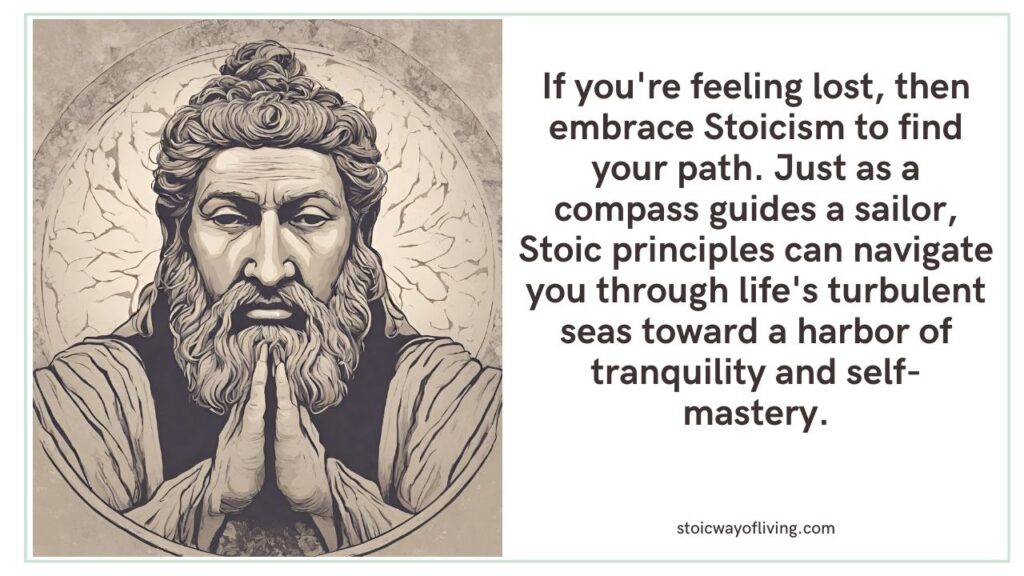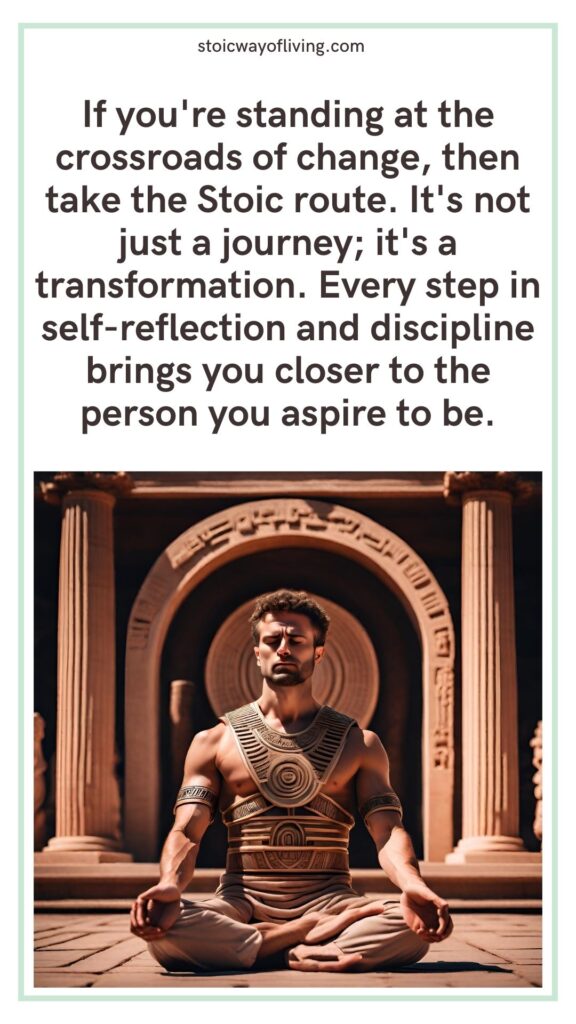Are you longing for a change in your life? Are you yearning for a fresh start filled with inner strength and resilience? Look no further than the timeless wisdom of Stoic principles.
This article will explore how you can recreate yourself, transforming into a stoic man with tranquility, self-discipline, and unwavering determination.
Understanding Stoic Principles

Stoicism is an ancient philosophy that teaches individuals to navigate challenges and find inner tranquility.
Rooted in the belief that we have control over our thoughts and actions, Stoic principles guide us toward self-improvement, emotional resilience, and ethical decision-making.
By understanding the fundamental principles of Stoicism, you can embark on a journey of self-transformation and cultivate a more meaningful and fulfilling life.
Embracing Self-Reflection
Self-reflection is a crucial aspect of Stoicism. It allows us to better understand ourselves and our place in the world.
By examining our lives honestly, we can identify areas for improvement and set clear goals for personal growth.
Self-reflection helps us become more self-aware and aligns our actions with our values and aspirations.
Examining Your Life
To embark on a Stoic journey of self-transformation, it is essential to take a step back and examine your life holistically. Look at your relationships, career, personal habits, and beliefs.
Ask yourself if these aspects of your life align with your values and contribute to your overall well-being.
This examination will help you identify areas where you can make positive changes and foster personal growth.
Identifying Areas for Improvement
Once you have examined your life, it’s time to identify areas for improvement and development as an individual.
Are there habits or behaviors that are holding you back? Are there negative emotions or thought patterns that need addressing?
By pinpointing these areas, you can begin to take action and implement positive changes in your life.

Setting Clear Goals
With a better understanding of yourself and areas for improvement, it’s essential to set clear goals for personal growth. These goals should be specific, realistic, and aligned with your values.
Whether developing a new skill, improving your relationships, or enhancing your mental well-being, setting goals will give you a sense of direction and purpose on your Stoic journey.
Practicing Emotional Rationality
Emotional rationality is a fundamental principle of Stoicism that teaches us to recognize and manage our emotions effectively.
Stoics believe that our emotions stem from our judgments and interpretations of events rather than the events themselves.
By becoming aware of our emotions and understanding their origin, we can cultivate emotional resilience and respond to challenges more clearly and with tranquility.
Recognizing Emotions
The first step in practicing emotional rationality is recognizing and acknowledging our emotions. Take the time to tune in and identify what you are feeling.
Are you experiencing joy, sadness, anger, or fear? By becoming aware of our emotions, we can analyze them objectively and understand their impact on our thoughts and actions.

Understanding Emotions Origin
Once you have recognized your emotions, it is essential to understand their origin. Stoics teach that our emotional responses are not caused by external events but rather by our internal judgments and beliefs about these events.
By examining the underlying thoughts and beliefs that trigger our emotions, we can better understand ourselves and challenge any irrational or unhelpful thinking patterns.
Cultivating Emotional Resilience
Emotional resilience is a crucial aspect of Stoic philosophy. It involves cultivating the ability to maintain inner tranquility and a rational mindset, even in the face of adversity.
By practicing emotional resilience, we can develop the strength to navigate life’s challenges with grace and balance.
This resilience allows us to respond to challenging situations from a place of calm and wisdom rather than react impulsively.

Developing Personal Discipline
Personal discipline is at the core of Stoicism. It refers to harnessing your willpower and implementing daily routines that align with your values and goals.
By cultivating discipline, you can prioritize what truly matters to you and stay committed to your journey of self-transformation.
Harnessing Willpower
Harnessing your willpower is essential for personal discipline. It requires you to cultivate the strength to resist immediate gratification and make choices that align with your long-term goals.
By developing a strong sense of self-control, you can overcome distractions and temptations that may hinder your progress.
Implementing Daily Routines
Implementing daily routines is an effective way to cultivate personal discipline. Establishing consistent habits and rituals creates a structure that supports your goals and values.
Whether waking up early to engage in mindfulness practices, dedicating time for physical exercise, or setting aside moments for self-reflection, daily routines help you stay focused and committed to your Stoic journey.
Prioritizing What Truly Matters
Stoicism teaches us to prioritize what truly matters in life. By examining our values and aspirations, we can determine what is most important to us and ensure that our actions align with these priorities.
By focusing on what truly matters, we can avoid being consumed by trivial concerns and invest our time and energy in pursuits that bring us fulfillment and contribute to our personal growth.

Fostering Inner Tranquility
Inner tranquility is the cornerstone of Stoicism. It involves finding peace and contentment within ourselves, regardless of external circumstances.
Stoics believe that true happiness comes from accepting the things we cannot change and finding contentment in simplicity.
Accepting the Unchangeable
Accepting the unchangeable is a crucial aspect of fostering inner tranquility. Stoics emphasize acknowledging that certain things in life are beyond our control.
By accepting immutable aspects, such as the actions of others or unexpected events, we can avoid unnecessary suffering and instead focus on what we can control—our thoughts, actions, and attitudes.
Finding Contentment in Simplicity
Stoics encourage us to find contentment in simplicity. We can cultivate a sense of fulfillment that transcends materialistic desires by shifting our focus from external possessions to internal virtues.
Recognizing that true happiness comes from within enables us to appreciate the smaller joys in life and find contentment in the present moment.
Embracing Impermanence
Embracing impermanence is another crucial aspect of fostering inner tranquility. Stoicism teaches us that everything in life is transient, including our existence.
By accepting the impermanence of things, we can let go of attachments and live in the present moment with gratitude.
Embracing impermanence also reminds us to make the most of our time and cherish the relationships and experiences that bring us joy.
Taking Responsibility: The Power of Choice
Stoicism emphasizes taking responsibility for our lives and recognizing the power of choice.
By assuming control over our thoughts, actions, and attitudes, we can shape our destiny and live a life of purpose and integrity.
Assuming Control
Assuming control involves acknowledging that we have agency over our own lives. Stoics believe we can choose how to respond to external events, even if we cannot control them.
Recognizing our power to choose our thoughts, emotions, and actions allows us to navigate life’s challenges with grace and resilience.
Accepting Responsibility
Accepting responsibility is like assuming control. Stoicism teaches us to take ownership of our decisions and their consequences.
Instead of blaming external factors for our circumstances, we can accept responsibility for our choices and actively work towards improving ourselves and our lives.
Making Ethical Decisions
Stoic philosophy emphasizes ethical decisions. By aligning our choices with virtues such as wisdom, justice, courage, and self-discipline, we can lead a life of integrity and moral goodness.
Making ethical decisions allows us to find meaning and fulfillment while contributing to the well-being of others and society.
Value of Virtue in Self-Transformation
Central to Stoicism is the understanding that virtue is the highest good and the ultimate goal of human life.
We can strive towards personal and moral excellence by cultivating virtuous habits and embodying Stoic ideals.
Virtue as the Highest Good
Stoics believe virtue should be our ultimate goal rather than external achievements or possessions.
Virtue is the absence of vice and the active cultivation of moral excellence. We can lead a meaningful and fulfilling life by prioritizing virtuous actions and character traits.
Cultivating Virtuous Habits
Cultivating virtuous habits is an essential aspect of Stoic philosophy.
By consistently practicing virtues such as wisdom, justice, courage, self-discipline, and compassion, we can strengthen our character and become the best version of ourselves.
These habits shape our actions and interactions with others, contributing to a more harmonious and virtuous society.
Embodying the Stoic Ideal
To fully embrace Stoic principles, embodying the Stoic ideal in our daily lives is essential.
We can align our actions with our philosophical beliefs by applying Stoic teachings to various aspects of life, such as relationships, work, and personal growth.
Embodying the Stoic ideal means living with integrity, resilience, and inner tranquility, thereby becoming an example of Stoic philosophy in action.
Cultivating Gratitude and Resilience
Cultivating gratitude and resilience is an integral part of the Stoic journey.
By recognizing the blessings in our lives, practicing daily gratitude, and building emotional resilience, we can enhance our well-being and navigate life’s challenges with strength and grace.
Recognizing Life’s Blessings
Stoics encourage us to recognize the blessings in our lives, whether small or insignificant.
By cultivating a mindset of gratitude, we shift our focus towards the positive aspects, fostering a sense of contentment and appreciation.
Practicing Daily Gratitude
Daily gratitude is a stoic exercise that involves reflecting on what we are thankful for.
Dedicate a few moments each day to remind yourself of the blessings in your life – your relationships, achievements, experiences, and even the simple pleasures.
By cultivating gratitude, we develop a positive outlook and a deeper appreciation for the present moment.
Building Resilience
Building emotional resilience is crucial for navigating life’s ups and downs. Stoicism teaches us to view adversity as an opportunity for growth and approach challenges calmly and rationally.
By developing resilience, we can bounce back from setbacks, learn from failures, and maintain inner tranquility even in adversity.
Mastering Your Mind
Mastering your mind is a central principle of Stoicism. You can cultivate a calm and focused mindset by training your thoughts, practicing mindfulness, and controlling your inner dialogue.
This practice empowers you to navigate life’s challenges and cultivate inner tranquility.
Training Your Thoughts
Stoics believe that our thoughts shape our reality. By training your thoughts, you can cultivate a rational, optimistic mindset and focus on the present moment.
Challenge negative thought patterns, replace them with more constructive and empowering beliefs, and strive to view situations from a broader perspective.
Practicing Mindfulness
Mindfulness is a powerful tool in the Stoic toolkit. Practicing mindfulness can enhance your ability to stay present, observe your thoughts and emotions without judgment, and respond to situations with clarity and intention.
Incorporate mindfulness practices such as meditation, deep breathing, or mindful walking into your daily routine to cultivate awareness and tranquility.
Controlling Inner Dialogue
Stoicism teaches us to be mindful of our inner dialogue and actively shape our self-talk.
Replacing self-defeating thoughts with empowering affirmations can create a positive and encouraging inner dialogue supporting your growth and well-being.
Reframe challenges as opportunities for learning and growth, and remind yourself of your strength and resilience.
Applying Stoic Principles in Daily Life
The true power of Stoic principles lies in their application to our daily lives.
By integrating Stoic philosophy into our actions and interactions, we can navigate life’s challenges with equanimity, build solid and meaningful relationships, and live a more fulfilling and purposeful life.
Dealing with Adversity
Adversity is inevitable, but Stoic principles equip us with the tools to face it resiliently.
When faced with challenges, remind yourself of the Stoic principles of acceptance, emotional rationality, and focusing on what is within your control.
Approach difficulties as opportunities for growth and learning rather than becoming overwhelmed.
Maintaining Equanimity
Stoics emphasize the importance of maintaining stability, or an even-tempered state of mind, in the face of external circumstances.
You can respond to challenging situations calmly and clearly by cultivating emotional resilience and practicing mindfulness.
Cultivate the ability to detach yourself from external outcomes and instead focus on your thoughts and actions.
Building Strong Relationships
Stoicism teaches us the value of cultivating solid and meaningful relationships. We can build connections based on mutual respect and understanding by embodying compassion, kindness, and empathy.
Practice active listening, show empathy towards others, and prioritize authentic communication in your relationships.
By fostering strong relationships, you create a support system that enhances your well-being and contributes to your personal growth.
Conclusion
Understanding and applying Stoic principles can profoundly transform your life.
Stoicism offers a practical and empowering philosophy for self-transformation, from embracing self-reflection and practicing emotional rationality to developing personal discipline and cultivating gratitude.
Incorporating Stoic teachings into your daily life allows you to navigate challenges with poise, foster inner tranquility, and live a more meaningful and fulfilling existence.
So embrace the Stoic principles, embark on your journey of self-transformation, and recreate yourself like a Stoic in 2024 and beyond.


